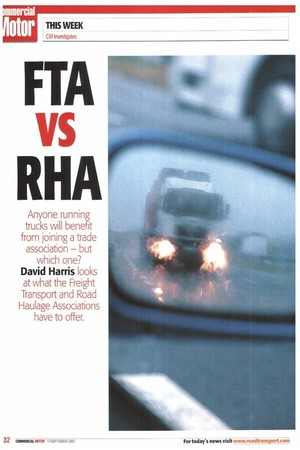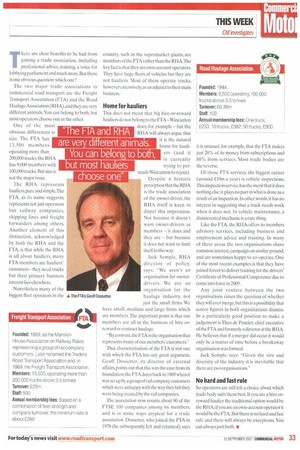Frit vs litIA
Page 32

Page 33

If you've noticed an error in this article please click here to report it so we can fix it.
Anyone running trucks will benefit from joining a trade
association — but
which one?
David Harris looks at what the Freight Transport and Road Haulage Associations have to offer.
There arc clear benefits to be had from joining a trade association, including professional advice, training, a voice for lobbying parliament and much more.B But there is one obvious question: which one?
The two major trade associations in commercial road transport are the Freight Transport Association (PTA) and the Road Haulage Association (RHA),and they are very different animals. You can belong to both, but most operators choose one or the other.
One of the most obvious differences is size. The FTA has 13,500 members operating more than 200,000 trucks the RHA has 9,000 members with 100,0(X) trucks. But size is not the major issue.
The RHA represents hauliers,pure and simple.The FTA, as its name suggests. represents not just operators but railway companies, shipping lines and freight forwarders among others. Another element of this distinction, acknowledged by both the RHA and the FTA, is that while the RHA is all about hauliers, many FTA members are hauliers' customers— they need trucks but their primary business interest lies elsewhere. "The FTA and RHA Nonetheless many of the biggest fleet operators in the country, such as the supermarket giants, are members of the FTA rather than the RHA.The key fact is that they are own-account operators. They have huge fleets of vehicles but they are not hauliers. Most of them operate trucks, however extensively,as an adjunct to their main business.
Home for hauliers
This does not mean that big hire-or-reward hauliers do not belong to the FTA—Wincanton does, for example — but the RHA will always argue that it is the natural home for hauliers (and it is currently trying to persuade Wincanton to rejoin).
Despite a historic perception that the RHA is the trade association of the owner-driver, the RHA itself is keen to dispel this impression. Not because it doesn't want owner-drivers as members — it does and they are — but because it does not want to limit itself in this way.
Jack Semple, RHA director of policy, says: "We aren't an organisation for ownerdrivers. We are an organisation for the haulage industry, not just the small firms. We have small, medium and large firms which are members. The important point is that our members are all in the business of hire-orreward or contract haulage.
"By contrast,the FTA is the organisation that represents many of our members' customers."
That characterisation of the FTA is not one with which the FTA has any great argument. Geoff Dossetter, its director of external affairs, poin is out that this was the case from its foundation: the FTA dates back to 1889 when it was set up by a group of rail company customers which were unhappy with the way they felt they were being treated by the rail companies.
The association now counts about 80 of the FTSE 100 companies among its members, and is in some ways atypical for a trade association. Dossetter, who joined the FTA in 1978 (he subsequently left and returned), says it is unusual, for example, that the FTA makes just 20% of its money from subscriptions and 80% from services. Most trade bodies are the reverse.
Of those FTA services, the biggest earner (around flOm a year) is vehicle inspections. This inspection service has the merit that it does nothing else; it plays no part in what is done as a result of an inspection. In other words, it has no interest in suggesting that a truck needs work when it does not. In vehicle maintenance, a disinterested mechanic is a rare thing.
Like the FTA, the RHA offers its members advisory services, including business and employment advice and training. In many of these areas the two organisations share common interest, campaign on similar ground, and are sometimes happy to co-operate. One of the most recent examples is that they have joined forces to deliver training for the drivers' Certificate of Professional Competence due to come into force in 2009.
Any joint venture between the two organisations raises the question of whether they will ever merge, but this is a possibility that senior figures in both organisations dismiss. In a particularly good position to make a judgement is Theo de Pencier, chief executive of the FTA and formerly a director at the RHA. He believes that if a merger did occur it would only be a matter of time before a breakaway organisation was formed.
Jack Semple says: "Given the size and diversity of the industry it is inevitable that there are two organisations."
No hard and fast rule
So operators are still left a choice about which trade body suits them best. If you are a hire-orreward haulier the traditional option would be the RHA;if you are an own-account operator it would be the FTA. But there is no hard and fast rule and there will always he exceptions. You can always join both.•




























































































































































































